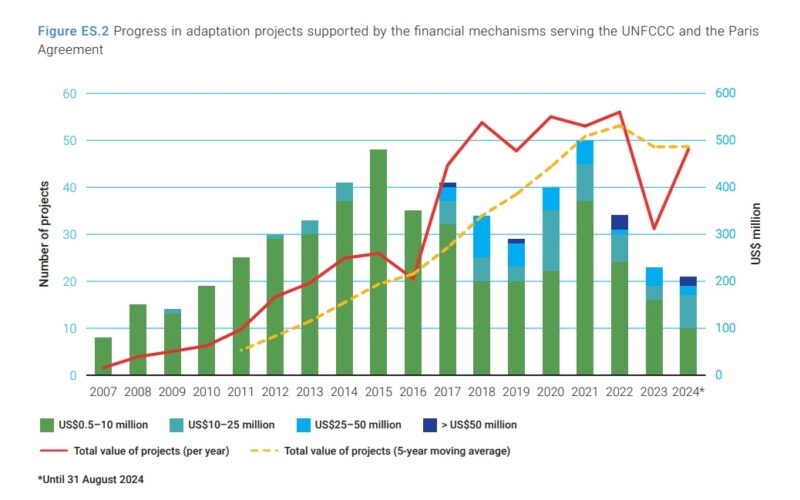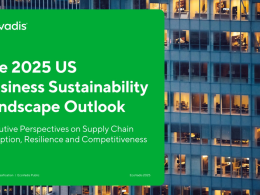The United Nations Environment Programme’s (UNEP) ‘Adaptation Gap Report 2024: Come Hell and High Water’ urges a major increase in global climate adaptation efforts, with a call for financial commitments at COP29. Released ahead of the climate talks in Baku, Azerbaijan, the report emphasises the urgent need for stronger adaptation measures, as global average temperatures near the critical threshold of 1.5°C above pre-industrial levels. Without drastic emissions cuts, UNEP warns, temperatures could rise between 2.6-3.1°C this century, placing already vulnerable communities at even greater risk.
“Climate catastrophe is hammering health, widening inequalities, harming sustainable development, and rocking the foundations of peace,” UN Secretary-General António Guterres said in a video message.
“The vulnerable are hardest hit. And taxpayers are footing the bill. While the purveyors of all this destruction – particularly the fossil fuel industry – reap massive profits and subsidies. We need developed countries to double adaptation finance to at least $40 billion a year by 2025 – an important step to closing the finance gap. We need to unlock a new climate finance goal at COP29,” he added.
International public adaptation finance flows to developing countries increased from US$22 billion in 2021 to US$28 billion in 2022: the largest absolute and relative year-on-year increase since the Paris Agreement. This reflects progress towards the Glasgow Climate Pact, which urged developed nations to at least double adaptation finance to developing countries from about US$19 billion in 2019 by 2025. However, even achieving the Glasgow Climate Pact goal would only reduce the adaptation finance gap, which is estimated at US$187-359 billion per year, by approximately 5 per cent.
“Climate change is already devastating communities across the world, particularly the most poor and vulnerable. Raging storms are flattening homes, wildfires are wiping out forests, and land degradation and drought are degrading landscapes,” said Inger Andersen, Executive Director of UNEP.
Andersen added, “People, their livelihoods and the nature upon which they depend are in real danger from the consequences of climate change. Without action, this is a preview of what our future holds and why there simply is no excuse for the world not to get serious about adaptation, now.”
The report calls for a new climate finance goal at COP29 and stronger adaptation commitments in nations’ climate pledges, due before COP30 in Brazil next year. Adaptation planning has seen progress, with 171 countries now having at least one adaptation planning instrument in place. However, 26 countries still lack national adaptation plans, ten of which have no plans to develop one. Seven of these countries are conflict-affected or fragile states, underscoring the need for tailored support to meet the UAE Framework for Global Climate Resilience’s 2030 planning target.
While adaptation actions are increasing, they fall short of the scale needed to address intensifying climate risks. Evaluations show that roughly half of UNFCCC-supported adaptation projects are unsustainable without continued funding, and countries report that adaptation implementation is slower than necessary. Enhanced efforts are needed to achieve the UAE Framework’s target.
To close the adaptation finance gap, innovative financial solutions are essential. UNEP suggests several public sector-enabling factors, including climate fiscal planning, climate budget tagging, adaptation investment planning, and the establishment of financing facilities. Reforms in international finance institutions and multilateral development banks are recommended to support these measures.
The report also emphasises the need to equitably distribute adaptation costs. In many cases, developing nations bear the financial burden, which UNEP argues is inconsistent with principles of shared responsibility and the polluter-pays principle. For effective adaptation, UNEP calls for strengthening capacity-building and technology transfer, which are critical focal points for COP29.
UNFCCC documents consistently highlight the need for capacity-building and technology in water, food, and agriculture, but efforts often lack coordination, are costly, and fall short of reaching marginalised groups. Financial barriers, high upfront costs, and unsupportive legal frameworks further limit technology transfer effectiveness.
The report recommends focusing on mobilising existing capacities, integrating gender equality and social inclusion, and developing a stronger evidence base through monitoring and evaluation. Capacity-building and technology transfer should be prioritised across sectors and development priorities to ensure adaptation strategies align with comprehensive development goals, rather than relying on isolated technological solutions.
















